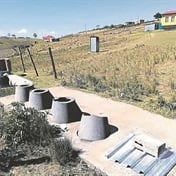An inability to confront the past and acknowledge the horrors of South Africa’s history will continue to hold the country back.
Professor Mark Solms told a recent Gordon Institute of Business Science forum on the psychological impediments of land reform that: “We have to face up as a nation to what happened. Not facing the historical facts is a cancer eating at our society.”
Solms, who is a neuroscientist and psychoanalyst, as well as being the owner of Franschhoek wine farm Solms-Delta, is renowned for his innovative land reform deal with the farm’s employees.
In 2005, the Solms family established the Wijn de Caab Trust to benefit the 200 historically disadvantaged residents and employees of the Solms-Delta wine estate.
Solms and his neighbour, Richard Astor, both put their farms up as collateral so that a third adjoining farm could be purchased by the workers, giving the Wijn de Caab Trust a 33% equity stake in Solms-Delta.
The staff ownership structure has been held up by many, including the Department of Rural Development and Land Reform, as an example for transformation in the agricultural sector.
Earlier this August, another agreement was reached between the Solms-Delta estate and the national government, allowing for the farm’s workers to take 45% of the business, funded by the National Empowerment Fund (NEF), with the NEF itself taking 5%.
On returning to South Africa in 2001 and assuming responsibility for the ownership and operations of the farm, Solms began to look for ways to transform the estate with the workers.
An excavation of the property by the University of Cape Town’s department of archeology followed, which Solms described as “an act of desperation.” The dig unearthed rock and stone tools from the Khoi San settlement site that was based on the site 6000 years ago. “Here was the hard evidence that they were there first,” he said.
The Delta farm, granted to settlers by Simon van der Stel in 1690, was established and run using slave labour for the next 200 years of its history after the original inhabitants had been removed from the land.
Solms’ next step was to take an oral history from all who lived on the farm of their experiences under apartheid: “It is shaming to see your life in the context of the farm workers and the grinding humiliation of poverty they suffered under apartheid,” he said of the experience.
Solms maintains that the process was an essential one: “This is what we have to do, face what really happened. It is a horrible, daunting process. We have to face the history and see the evidence and the facts.”
The land reform process on the Franschhoek farm was never intended as a model for the wine industry, or the broader agricultural sector, Solms said. However, some of the lessons learnt during the process could be useful as general principles, he conceded.
The first of these is that South Africans have to face historical facts, as we are now living with the consequences of the past. This was the initial step in attempting to correct the past. “Blind rage is not a solution. Neither is doing nothing,” Solms said.
“Facing the facts gives you your mind back. It enables you to start to find solutions,” he said.
The second principle was to recognise that the current situation is untenable. “It is imperative that we believe in the transformation of the agricultural sector. It is completely untenable that the perpetrators of history keep the land,” Solms said.
98% of the land in the South African wine industry still belongs to whites, a fact that many farmers refuse to acknowledge Solms said. “Nobody, in their right mind can believe that things can continue as they are.”
But Solms acknowledged that while the ethical solution is to give the land back, “humans essentially have selfish motives and want to keep their ill-gotten gains. We underestimated the psychological implications of this fraught topic,” he said.
His suggestions for widespread land reform are that any attempts should be incentivised, and not done as punitive measures. Soft loan funding could be used to recapitalise farms and converted into grant funding once transformation milestones have been reached.
“We have to facilitate an environment which acknowledges what has been done and find a way to move forward. We have to constantly work at social cohesion,” Solms concluded.
» City Press is a media sponsor of the Gibs forums




 Publications
Publications
 Partners
Partners








